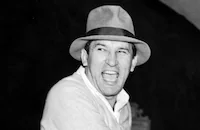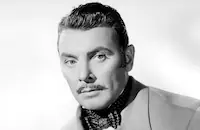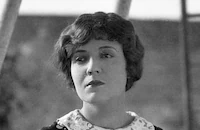The Crash

Brief Synopsis
Cast & Crew
William Dieterle
Ruth Chatterton
George Brent
Lois Wilson
Barbara Leonard
Paul Cavanagh
Film Details
Technical Specs

Synopsis
During the late 1920s, attractive Linda Gault flirts with important men to get stock market tips for her financier husband Geoffrey. In spite of the fact that Linda has just broken off her affair with banker John Fair, Geoffrey asks her to question him once more that evening at dinner. Reluctantly, she does, but Fair is suspicious and refuses to answer. To cover her failure, Linda lies to Geoffrey and pretends that Fair told her the market was going up. When the market crashes, Geoffrey loses his money. Because she is afraid to live in poverty as she did when she was a child, Linda runs away to Bermuda with a letter of credit. While waiting for Geoffrey to recover his wealth, she meets Ronnie Sanderson, an Australian sheep rancher. He falls in love with her and begs her to return to New York, get a divorce and marry him. At first she hesitates, thinking Australia will be dull, but when she learns that Geoffrey has lost everything, she agrees. Linda discovers that her maid, Celeste, has stolen her pearl necklace and sold it to cover her boyfriend's losses on the market. Now Linda has no money either, so she takes a job selling gowns in order to earn money for her divorce. Ronnie follows her from Bermuda and offers to pay all her expenses himself if she will leave with him that evening. She agrees, but on the way to the boat, stops to say goodbye to Geoffrey. When she realizes that he really loves her and that he needs her, she decides to stay with him.

Director

William Dieterle
Cast

Ruth Chatterton

George Brent

Lois Wilson
Barbara Leonard

Paul Cavanagh

Henry Kolker

Hardie Albright

Ivan Simpson

Helen Vinson
Edith Kingdon
Richard Tucker
Virginia Hammond
Crew

Film Details
Technical Specs

Articles
The Crash
Ruth Chatterton (Female [1933]) stars as Linda Gault, a philandering elitist whose husband Geoffrey (George Brent) has come to accept her casual infidelities. In fact, he's learned to profit from them. Because Linda is involved with well-connected financier John Fair (Henry Kolker), Geoff encourages her to glean investment tips from "the other man."
Linda has a momentary problem with the ethics of their twisted relationship, and complains to Geoff of "This unspoken conspiracy between us. I solicit tips with my charm and you convert them into money. And that's killed everything that ever was between us. Sometimes I'm half sick with shame at the things I do." These reservations are fleeting, and do not hinder her from keeping her date with Fair.
Eventually, Fair catches on to Linda and Geoff's game, and refuses to divulge crucial information about the direction of the market at a fateful juncture in U.S. economic history (October, 1929). Rather than admit failure to her husband, Linda lies, and tells him that Fair assured her the market is strong. Geoff invests heavily on the basis of this false information, and is summarily wiped out on Black Tuesday.
Because Geoff cannot support Linda in the degree of luxury to which she has become accustomed, he sends her to the Palace Hotel, where she must make do with only one full-time servant, instead of her usual retinue. Salvation from Linda's woes comes in the form of Ronald Sanderson (Paul Cavanagh), an Australian sheep farmer who offers to marry Linda and restore her to easy living. Linda returns to the states to obtain a divorce from Geoff, and there she has another bout of ethical guilt. But will this moment of reflection be strong enough to steer her off the course of perpetual self-absorption?
German-born Dieterle began his film career as an actor, appearing (as Wilhelm Dieterle) in such expressionist classics as Paul Leni's Waxworks (1924) and F.W. Murnau's Faust (1926). As did many of his contemporaries, Dieterle learned theatrical craft under the supervision of stage impresario Max Reinhardt, which provided him with the tools to work behind the camera as well.
He directed several German-language films for Hollywood studios' European arms, among them Universal's Ich lebe fr Dich (Triumph of Love [1929]) and Warner Bros./First National's Der Tanz geht weiter (The Dance Goes On [1930]). By the time he had developed his conversational English, Dieterle won the opportunity to direct English-language films with A-list talent. The first of these was The Last Flight (1931), starring Richard Barthelmess.
After turning out a rapid succession of profitable pictures for Warner Bros./First National, Dieterle was given the daunting task of co-directing one of the studio's biggest gambles, a lavish production of Shakespeare's A Midsummer Night's Dream (1935), co-directed with his former mentor, Max Reinhardt. This expensive, ambitious (some might say overblown) project tested Dieterle's skills as director. His ability to keep the production from jumping the rails won him the respect of Warner Bros. management and opened up a great many doors of opportunity. In Dieterle, the studio found a director with European art film credentials, but one who did not chafe within the factory system (which had alienated the likes of Reinhardt, Murnau, Sergei Eisenstein, G.W. Pabst, and others). As film historian Richard Koszarski succinctly put it, "Hollywood was the perfect home for Dieterle, a director who needed the guidance and support which only a system could provide, and who lacked the temperament to bang his head uselessly against its strictures and regulations."
On this topic of the survival of a European artiste in Hollywood, Dieterle wrote in 1952, "I think the European director should come to Hollywood in a frame of mind to take the best from Hollywood and give his best, ignoring, even when it hurts, the petty irritations imposed by the impersonal handling of pictures. Eventually, if he gains a reputation as co-operative and craftsmanlike, he may be allowed fuller freedom of expression...With a sense of humour, patience and hard work one can make pictures of high artistic standard in Hollywood."
Dieterle found his niche as a director of intelligent biographical films, such as The Story of Louis Pasteur (1935), Best Picture-winner The Life of Emile Zola (1937), and Juarez (1939), all starring Paul Muni. Later biopics included Dr. Ehrlich's Magic Bullet (1940) and A Dispatch from Reuter's (1940, both starring Edward G. Robinson), Tennessee Johnson (1942) and Omar Khayyam (1957).
Widely considered Dieterle's greatest achievement as director was 1941's The Devil and Daniel Webster (aka All That Money Can Buy). Curiously, it was neither a biopic nor a European-style art film, but a bit of sociopolitical Americana based on a story by Stephen Vincent Benet.
Dieterle was considered an eccentric figure on the set. According to William R. Meyer's book Warner Brothers Directors, Dieterle, "never started a film unless his astrologer deemed the stars in the sky to be in the proper position...[he] always wore a pair of white gloves on the set...The gloves weren't considered a bow to superstition. Dieterle claimed that he had formed the habit of wearing them in the 1920s while working in the German theatre, when he would often be asked to move scenery right before going onstage, and he didn't want to get his hands dirty. If the director's odd habits, distinguished frame, and lofty statements gave the impression that he was a pious, 'superior' European, the reality didn't follow suit. Dieterle could often be seen on the set in a baggy woolen sweater, with ruffled hair and bangs slipping either way on his forehead, guiding an actor in what was described as 'a bundle of concentrated energy' by Alexander Kahn of the Daily Worker. And every morning his wife Charlotta drove him to the studio."
After a long, successful career in Hollywood, Dieterle eventually returned to Germany, directing a number of German-language films and TV projects. He died on December 8, 1972.
Director: William Dieterle
Screenplay: Earl Baldwin; Larry Barratto (novel "Children of Pleasure" and screenplay)
Cinematography: Ernest Haller
Art Direction: Jack Okey
Music: W. Franke Harling (uncredited)
Film Editing: Owen Marks
Cast: Ruth Chatterton (Linda Gault), George Brent (Geoffrey Gault), Lois Wilson (Marcia Peterson), Barbara Leonard (Celeste - Linda's French Maid), Paul Cavanagh (Ronald 'Ronnie' Sanderson), Henry Kolker (John 'Jack' Fair), Hardie Albright (Arthur Pringle).
BW-57m.
by Bret Wood

The Crash
Quotes
Trivia
Notes
The film's working title was Children of Pleasure. Original contracts show that Arnold Korff was signed to play John Fair and Henry Kolker was cast as Frank Parrish. George Brent and Ruth Chatterton were married just before the release of the film, after Chatterton's much publicized divorce from actor Ralph Forbes.















